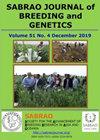EFFECTS OF ELEVATED PLANT DENSITY AND REDUCED NITROGEN ON AGRONOMIC AND YIELD ATTRIBUTES OF MAIZE INBRED LINES AND THEIR DIALLEL CROSSES
IF 1.7
Q3 PLANT SCIENCES
引用次数: 0
Abstract
Elevating plant density and improving N fertilizer rate for high density-tolerant genotype can maximize maize (Zea mays L.) grain productivity per unit land area. This investigation’s objective sought to evaluate the effects of stresses resulting from increasing plant density combined with reducing N application rate on traits of eight inbred lines and their diallel F1 crosses. Choosing eight maize inbred lines differing in tolerance to low N and high density (D) were samples for diallel crosses. Parents and crosses’ evaluation ensued in the 2020 and 2021 seasons under three plant densities: low (47,600), medium (71,400), and high (95,200) plants/ha, and three N fertilization rates: low (95 kg N/ha), medium (285 kg N/ha), and high (476 kg N/ha). Elevating plant density from 47,600 to 71,400 and 95,200 plants/ha caused a significant decrease in grain yield/plant by 25.43% and 30.15% for inbred parents and 17.92% and 25.65% for F1 crosses, respectively. This reduction correlated with significant decreases in all yield components but caused a notable increase in grain yield/ha by 13.69% and 27.33% for inbreds and 20.99% and 44.69% for F1 crosses, respectively. The best combination of plant population density and N level for giving the highest grain yield/ha was high N (476 kg N/ha) × high density (95,200 plants/ha) for all inbreds and all F1 crosses.提高植株密度和降低氮肥对玉米自交系及其双列杂交农艺性状和产量的影响
提高高密度耐受性基因型的株密度和提高氮肥施用量可以最大限度地提高玉米(Zea mays L.)的单位土地产量。本研究旨在评价提高植株密度和降低施氮量对8个自交系及其双列杂交F1性状的影响。选择8个玉米低氮高密度耐受性不同的自交系,进行双列杂交。在2020年和2021年对亲本和杂交组合进行了低(47600株/ha)、中(71400株/ha)和高(95200株/ha) 3种密度和低(95 kg N/ha)、中(285 kg N/ha)和高(476 kg N/ha) 3种施氮量的评价。单株密度由47,600株增加到71,400株和95,200株/ha后,自交系单株产量显著降低25.43%和30.15%,F1杂交单株产量显著降低17.92%和25.65%。这种降低与各产量成分的显著降低相关,但导致自交系和F1杂交的每公顷产量分别显著提高13.69%和27.33%和20.99%和44.69%。在所有自交系和所有F1杂交组合中,高氮(476 kg N/ha) ×高密度(95,200株/ha)是获得最高籽粒产量的最佳组合。
本文章由计算机程序翻译,如有差异,请以英文原文为准。
求助全文
约1分钟内获得全文
求助全文
来源期刊

Sabrao Journal of Breeding and Genetics
农林科学-奶制品与动物科学
CiteScore
1.90
自引率
50.00%
发文量
63
期刊介绍:
The SABRAO Journal of Breeding and Genetics is an international journal of plant breeding and genetics research and was first published in 1969. It is the official publication of the Society for the Advancement of Breeding Research in Asia and Oceania (SABRAO).
Its objectives are to: promote the international exchange of research information on plant breeding and genetics, by describing new research findings, or ideas of a basic or practical nature; and be a medium for the exchange of ideas and news regarding members of the Society.
The Journal gives priority to articles that are of direct relevance to plant breeders and with emphasis on the Asian region. Invited for publication are research articles, short communications, methods, reviews, commentaries, and opinion articles. Scientific contributions are refereed and edited to international standards.
The journal publishes articles for SABRAO members mainly. The Journal preferred strongly that at least one author should be a current member of the Society. Non-members may also publish in the journal.
 求助内容:
求助内容: 应助结果提醒方式:
应助结果提醒方式:


